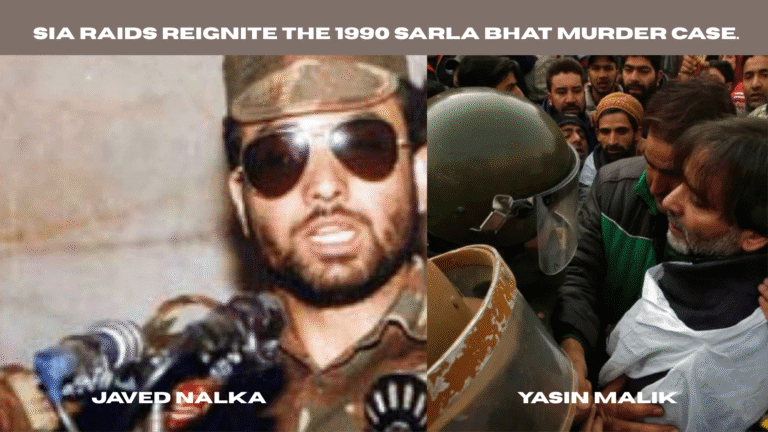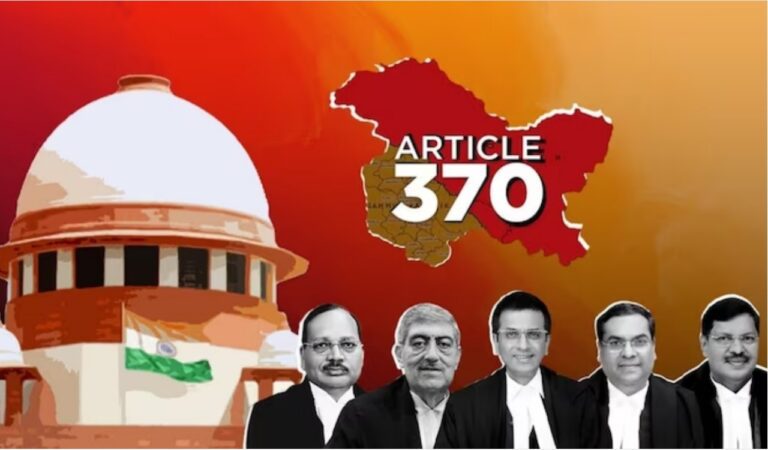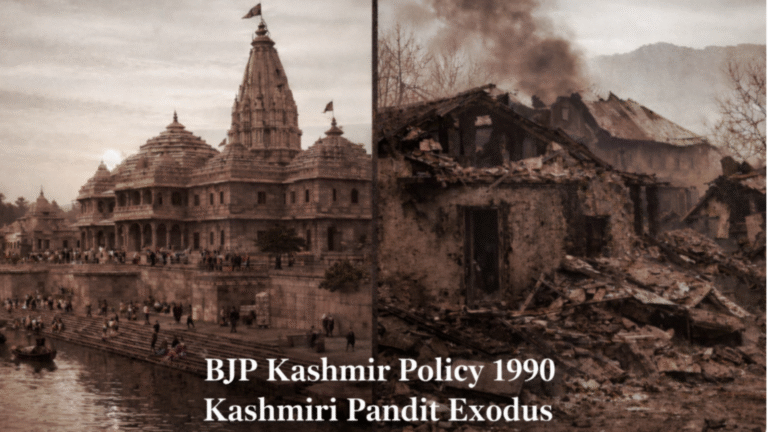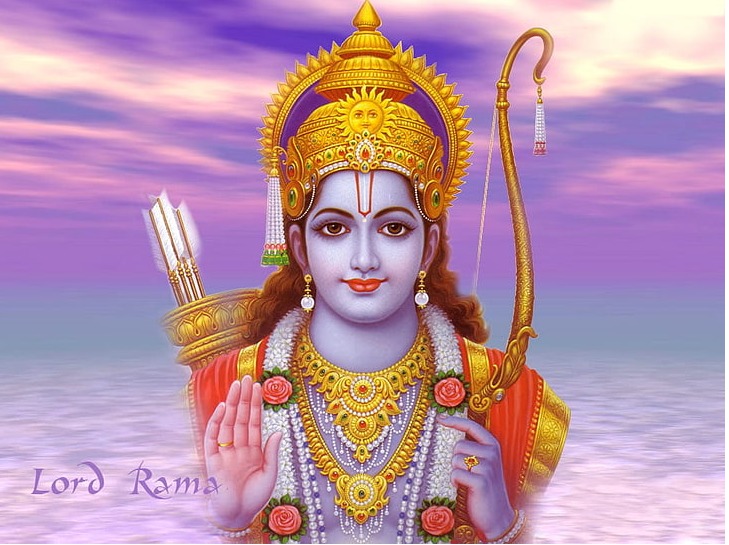Farooq Ahmed Dar, also known as Bitta Karate, is a notorious terrorist who is believed to have killed over 40 Kashmiri Pandits. He was arrested in 1990 and confessed to the murders of more than 20 Kashmiri Pandits on national television. Karate is a reminder of the horrors of the Kashmir conflict and the violence that has been inflicted on the region’s minority communities.
Bitta Karate was born in 1973 in Srinagar, Kashmir. He joined the ranks of the Jammu Kashmir Liberation Front (JKLF) in 1988, rapidly gaining a reputation for brutality and earning the moniker “Butcher of Kashmiri Pandits.”
After receiving armed training sponsored by the Pakistani military establishment for 32 days, Bitta Karate returned to Jammu and Kashmir, operating as a terrorist for the JKLF. He is believed to be responsible for the deaths of around 40 people, mostly Kashmiri Pandits.
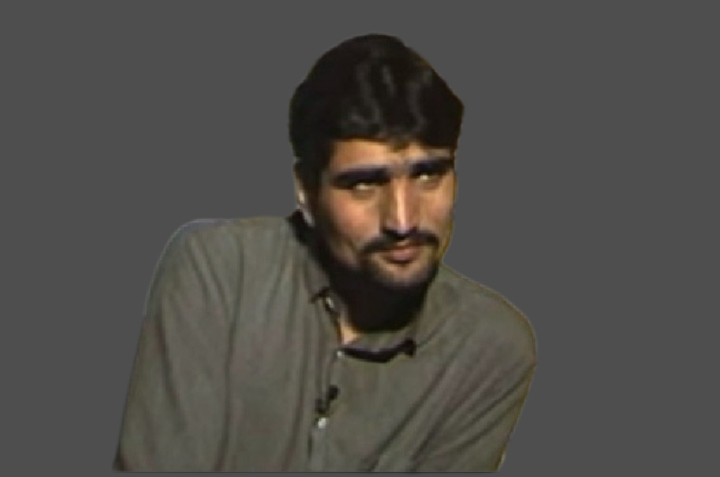
Bitta Karate: Confession of killing Kashmiri Pandits
In a chilling interview with India Today, Bitta Karate made shocking revelations about his involvement in the killings, of over 20 Kashmiri Pandits, admitting to the murder of Satish Tikoo, who was known to Bitta Karate . He also confessed to being responsible for the deaths of several other Kashmiri Pandits.
Killing of Satish Tikoo by Bitta Karate
In an interview given to India Today, Bitta Karate admitted that the first Victim was Satish Tikoo.W hen India Today asked, why did he kill Satish Tikoo. He told that he received orders from above and revealed he used to get orders from Ashfaq Majeed Wani, A prominent JKLF leader who formed a HAJY group with Yasin Malik.
The case is pending in the court and has been adjourned many times,
The brutal killing of BK Ganjoo by Bitta Karate
According to an interview given by Shiban Krishen Ganjoo, the brother of BK Ganjoo, to India Today, the incident took place when BK Ganjoo was preparing to leave for his office in Sonawar at approximately 8:10 in the morning. At that time, a group of five to six terrorists, led by Bitta Karate, arrived at their house to search for BK Ganjoo. BK Ganjoo was accompanied by his wife and their younger daughter, who was just one and a half years old.
Two individuals forcefully entered the house by banging on the door. They inquired about BK Ganjoo, but his wife insisted that he was not present in the house. However, a neighbour betrayed their hiding place, revealing that BK Ganjoo was hiding in a rice drum. The terrorists then shot BK Ganjoo multiple times until their magazines were empty, causing his blood to mix with the rice. Disturbingly, they forced BK Ganjoo’s wife to eat the blood-soaked rice to taste
It’s important to mention that these details were documented by Rahul Pandita in his book “Our Moon Has Blood Clots.” However, the accuracy of the account would need verification to establish its credibility.
Arrest of Bitta Karate
Bitta Karate’s reign of terror led to his arrest in June 1990 by the Border Security Force, resulting in 19 cases being filed against him. He spent 16 years in detention, but his release on indefinite bail in October 2006 raised questions about the Government’s commitment to bringing those responsible for the killings of Kashmiri Pandits to justice.
The court acknowledged that the charges against the accused are serious and could result in a death sentence or life imprisonment. However, the prosecution has shown a complete lack of interest in arguing the case.
This lack of follow-through and apparent indifference towards the case has left many puzzled and frustrated. The public demands to know why the lawyer of Satish Tikoo has not shown a stronger commitment to seeking justice for Satish Tikoo and others who were killed by Bitta Karate.
Comparisons–No One Killed Jessica Lal Case:
The killing of Satish Tikoo , B K Ganjoo and many Kashmiri Pandits by Bitta Karate reminds me of the murder of Jessica Lal case which took place in 1999 and was a watershed moment in India’s legal history. Jessica Lal, a young model, was shot dead by Manu Sharma, the son of a prominent politician after she refused to serve him alcohol at a party. Despite several eyewitness accounts and compelling evidence, Manu Sharma managed to walk free due to the alleged tampering of evidence and intimidation of witnesses
Bitta Karate : Reminder of Horror
The case of Bitta Karate is a stark reminder of the horrors endured during the Kashmir conflict. He represents the violence and intolerance that has engulfed the region for decades. His release on bail in 2006 was perceived by many as a lack of resolve from the Indian government to hold accountable those responsible for the killings of Kashmiri Pandits.
The case of Bitta Karate is a cautionary tale, a sombre reminder of the human cost and devastation caused by armed conflicts. It underscores the urgent need for peace, dialogue, and reconciliation in the Kashmir region. To achieve lasting solutions, it is crucial for all stakeholders to engage in constructive dialogue and work towards a future where violence and hatred have no place. Only through collective efforts can the path to a more harmonious and stable Kashmir be paved.
Chronology
● June 1990: Bitta Karate is arrested under the Jammu and Kashmir Public Safety Act.
● 2006: Karate is released from jail on indefinite bail.
● 2017: The Supreme Court of India dismisses a plea filed by the Kashmiri Pandit NGO Roots in Kashmir, which sought a probe into the killings of Kashmiri Pandits by Bitta Karate.
● July 19, 2019: He was arrested by the National Investigation Agency (NIA) in New Delhi on charges of terror funding.
● March 2022: A Srinagar court hears an application for the opening of a criminal trial against Bitta Karate in the murder of Kashmiri Pandit Satish Tikoo in 1990. The matter was listed for further hearing on May 4.
● May 4, 2022: The Srinagar court adjourns the hearing of the Bitta Karate case after the lawyer appearing for the petitioner claims that Jammu and Kashmir Police didn’t provide him security despite a Supreme Court order.
● June 2022: The Supreme Court of India grants bail to Bitta Karate in a terror funding case.
Call for action
The fact that Bitta Karate, a man accused of heinous crimes and brutalities during the peak of militancy in Kashmir, is now living freely in Srinagar after being granted bail by the Supreme Court of India, is a stark and disheartening reminder of the challenges faced in delivering justice in complex and sensitive cases.
The Bitta Karate case is a glaring example of the need for comprehensive judicial reforms, including witness protection, faster trial processes, and stricter enforcement against those accused of human rights abuses. Only through a robust and fair legal system can we hope to bring closure to the victims’ families and ensure that justice prevails, no matter how powerful or influential the accused may be.
It is the duty of the legal fraternity, the judiciary, and the government to take serious cognizance of such cases and work towards establishing a transparent and accountable system that serves the interests of justice and holds accountable those who perpetrate violence and brutality.
Also read


